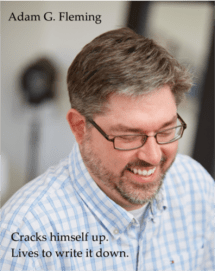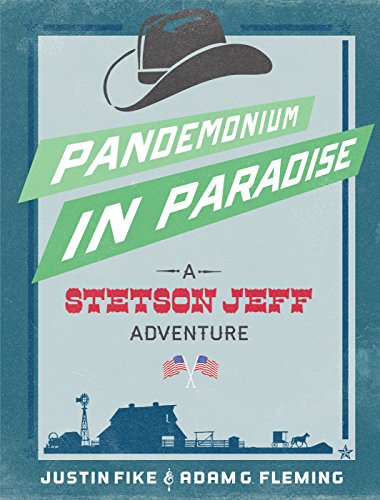
Justin Fike contacted me in the summer of 2009. It had been a little while since he’d graduated from Brown University and he was trying to decide whether or not to commit to being a writer. He had a book in process, but the vision was huge. It might end up being a trilogy, he thought, and it seemed like a lot of work. Could he really make it as a writer?
I did five coaching sessions with Justin (he’s given me permission to share that publicly) and he did decide to push on. Some time later, he asked me if I’d write a letter of recommendation for the Master’s in Creative Writing program at Oxford University. I felt a little under-qualified, but I did it. Justin got in, graduated… time went on… he still hadn’t finished that book.
Justin and I have been in touch ever since. In 2016, we met again at a conference in Thailand, and decided to write a series of action-adventure/comedy books called the Stetson Jeff Adventures. Our main character is a cross between any Chuck Norris character (he really only plays one guy, right?) and Forrest Gump, three books have been published and several more are drafted as I write this.
But that story he was working on in 2009 still wasn’t done, until this weekend Justin finally published Fire in the Dawn, the first book in his Twin Skies Trilogy.
I give you all this background just to say that sometimes people with huge ideas and lots of talent can take a LONG time to get that book out. This in itself commands my respect.
I have learned a lot from Justin about story beats: the aspect of writing that involves keeping the reader engaged, tools and techniques to make you want to turn the page. Justin is whiz-bang at this, and I have a feeling that by the time we’re done with 9 Stetson Jeff books and he finishes the rest of his Trilogy, he’s going to be at a level we’d have to call masterful. So here is my review:
Fire in the Dawn is set in a fantasy world similar to Medieval Japan. Justin taps into a deep knowledge and understanding of cultures to construct a world that feels real, with a political landscape that has treachery on every side. There are social and racial themes throughout that keeps you guessing about how his main character will be able to accomplish his goals, and intriguing alliances. Like any good fantasy story, there’s a bit of magic thrown in that refers to the power of qi but some deeper magic too.
All told, if you’re a reader of lots of fantasy lit, you’re going to love what Fike has done with the genre. He’s gotten away from the trolls, orcs, dragons and wizards, and done something exceptional, fresh, and exciting. And if you’re not into the fantasy genre, that’s okay– Fire in the Dawn has a literary quality that’s appealing to a broader-than-fantasy-readers audience in a way that’s similar to how I experienced George R.R. Martin’s Game of Thrones. Justin’s work isn’t as gory and doesn’t have the perverse sexual violence of Martin’s Game of Thrones, nor does it have the same immense complexity of a cast of characters of hundreds you have to track, so it’s definitely lighter reading in several ways. The comparison is being made strictly based on the fact that it’s literary. Fike’s world has plenty of depth and texture to explore, and a certain amount of intrigue. He keeps the action moving, so you never bog down with lengthy explanations of the world. The first few chapters you may find yourself wondering what is going on, and where you are, so it will be helpful to refer to the map! I’m eager to read the second book in the trilogy.
Also, check out that sweet cover art. Top notch professional work!
Justin’s promoting Fire in the Dawn on Amazon for free at the moment, but the promotion ends today, so get it now!
Also, if you’d like to check out the work that Justin and I have done together, here’s the link to The Stetson Jeff Adventures, Volume 1, which includes “Beatdown in Bangkok”, “Mayhem in Marrakesh”, and “Pandemonium in Paradise” plus a bonus short story, “A Very Stetson Christmas”, available in paperback and as an e-book.








